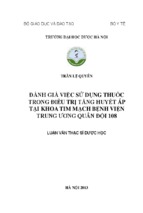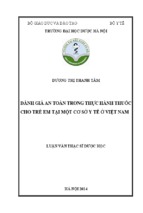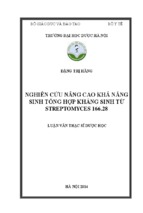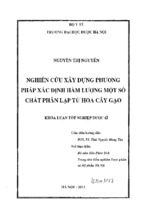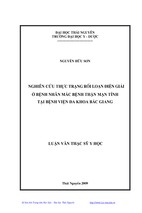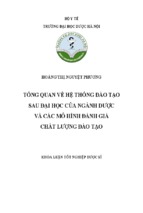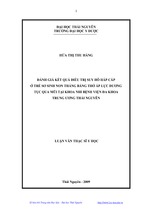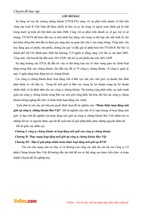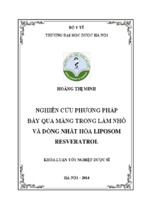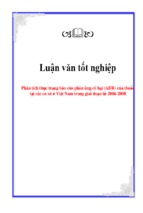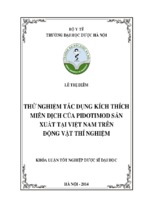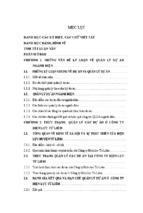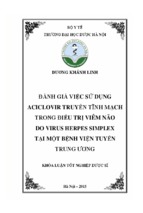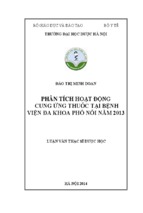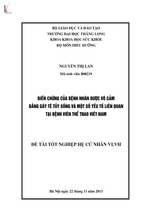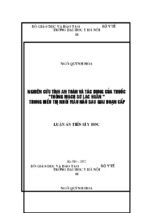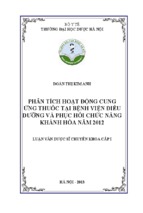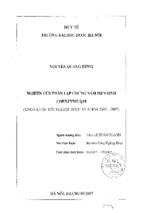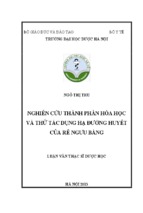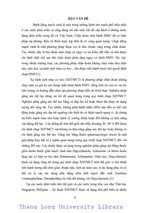ACCOUNTING ETHICS AND ITS IMPORTANT ROLE FOR REDUCTION OF
ACCOUNTING FRAUD: AN EMPIRICAL STUDY IN HANOI
BY
VU HAI YEN
Graduation Project Submitted to the Department of Business Studies, HELP
University College, in Partial Fulfillment of the Requirements for the Degree of
Bachelor of Business (Accouting) Hons
JUNE 2010
1
Declaration of Originality and Word Count
DECLARATION
I hereby declare that the graduation project is based on my original work except for
quotations and citations which have been duly acknowledged. I also declare that it has
not been previously or concurrently submitted for any other courses/degrees at HELP
University College or other institutions. The word count is 9,477 words
Vu Hai Yen
Date:
2
Abstract
ACCOUNTING ETHICS AND ITS IMPORTANT ROLE FOR REDUCTION OF
ACCOUNTING FRAUD: AN EMPIRICAL STUDY IN HANOI
By
VU HAI YEN
June 2010
Supervisor: Dr. Le Van Lien
Ethics is a sensitive concept of any profession in society, especially for career
that closely associated with economic activities such as accounting. Given the code of
ethics for professional accountant, and the factors that contribute to accounting fraud,
this study aims to examine the significance of ethical issues that challenge professional
accountant in good corporate governance and sustainable business practices. It is carried
out via a survey of 200 accountants which are divided into 2 groups. They are both from
public and private companies. The result of this study shows that, accountants who have
less experiences work more objectively than the one who have more experiences. But
they have more possibility to break ethical culture than the one who have more
experiences. And, ethical conflicts commonly arise in the organization's relationship
with customers, employees, suppliers, and other individuals, and also as a result of these
acts as courtesy gifts, kickbacks and discriminatory pricing.
3
Acknowledgements
This study wouldn’t have been performed without the help of helpful people.
Sincere thanks to my supervisor, Dr. Le Van Lien for his support, guidance and
vision for all my study.
Sincere thanks to Mr. Dang Ngoc Quang for helping me conduct survey quickly
and effectively.
4
TABLE OF CONTENTS
Page
Declaration of Originality and Word count
2
Abstract
3
Acknowledgements
4
Table of Contents
5
Chapter 1: Introduction
9
1.1 Research Background
10
1.2 Problem Statement
12
1.3 Objectives and Sphere of Research
14
1.3.1 Objectives of Research
14
1.3.2 Sphere of Research
14
1.4 Research Methods
15
1.5 Structure of Research
16
Chapter 2: Literature Review
17
2.1 Code of Ethics
18
2.2 Code of Ethics for Professional Accountant
19
2.3 The Factors that Contribute to Accounting Fraud
21
2.3.1 Corporate Transparency
21
2.3.2 Corporate Values and Behaviour
22
5
2.3.3 Money Culture
24
2.3.4 Vices of a Capitalistic Society
26
2.3.5 Legalistic Culture
28
Chapter 3: Research Methodology
30
3.1 Research Objectives
31
3.2 Research Method
32
3.3 Scope of Study
33
3.4 Sources of Data and Sample Selection
34
3.4.1 Collecting Data
34
3.4.2 Sample selection
34
3.5 Hypothesis Statement
36
Chapter 4: Result Analysis
37
4.1 Collection of Questionnaires
38
4.2 Description of Result
39
4.2.1 Part 1
4.2.1.1 Integrity
40
40
6
4.2.1.2 Objectivity
41
4.2.1.3 Professional competence and due care
42
4.2.1.4 Confidentiality
43
4.2.1.5 Confidentiality
44
4.2.2 Part 2
4.2.2.1 Money culture
45
45
4.2.2.2 Corporate values and behaviour and vices of a capitalistic
society
46
4.2.2.3 Corporate values and behaviour, corporate transparency
and legalistic culture
4.3 Result Analysis
47
48
4.3.1 Hypothesis 1
48
4.3.2 Hypothesis 2
49
4.3.3 Hypothesis 3
50
4.3.4 Hypothesis 4
51
4.4 General Discussion
52
Chapter 5: Conclusion and Recommendation
53
5.1 Conclusion
54
5.2 Recommendation
56
5.3 Limitation of Study
58
7
5.4 Suggestion for Future Research
59
References (Harvard System)
60
Appendices
64
8
CHAPTER 1
INTRODUCTION
1.1 Research Background
1.2 Problem Statement
1.3 Objectives and Sphere of Research
1.3.1 Objectives of research
1.3.2 Sphere of research
1.4 Research Methods
1.5 Structure of Research
9
1.1 Research Background
Ethics is a sensitive concept of any profession in society, especially for career
that closely associated with economic activities such as accounting. If there is no
professional ethics, the quality of accounting services provided to society will not ensure
its use value. For accountants, the professional ethics are “intangible assets”.
In Vietnam, Ministry of Finance issued a decision on the issuance and
publication of professional ethical standards of accounting and auditing in 2005. These
standards are built on the foundation of “independence, integrity, objectivity,
confidentiality, expertise and prudence, occupational status, compliance with
professional standards.” (http://www.tailieu.vn). They indicate that the scope and the
nature of accounting activities should be provided in an ethical way. However, in
practice, accountants do not always follow the rules and apply them in every aspect.
How many bosses will raise wages for employees if they do the work to comply with
ethical standards, benefit the public but the boss made a loss, if they deny wrongdoing or
ethical behavior can cause damage to the organization in a short time, but in the long
term it can provide greater benefits to reputation as well as financial by the
organizational decisions that remove acts as dishonest or fraudulent? It is a big and
difficult question. Clearly, the boundary between “ethical” and “unethical” is very
ambiguous.
Vietnam's economy is increasingly integrated with worldwide. The financial
institutions like banks, financial leasing companies, securities companies are appearing
more and more. This also means that when demand increases, the quality of accountant
10
are discussed in a prominent position than ever, and their activities and behavior affect
strongly to the health of a nation.
11
1.2 Problem Statement
For an organization, ethics plays an important role in curbing accounting fraud.
Like Nguyen Phuong Mai, chief of the representative office of the UK-based
Association of Chartered Certified Accountants (ACCA) said that expertise can train but
training ethics is very difficult (http://vietbao.vn). And, the lack of ethical behavior in
the accounting profession causes extremely serious consequences. The collapse of
companies such as Enron, WorldCom and Global Crossing in the USA are typical
examples.
The life of an accountant was filled by the laws and the figures which should be
calculated accurately. Every day they have to face many problems such as competition,
outstanding figures, the charges "not official" and commissions. Any deviation regarding
accounting data also seriously affect the decision process. For instance, data is adjusted
to suit the changing market, competitive effects, or "latency" in business cycles in the
financial statements. Following business perspective, it is positive adjustment in order to
reassure investors and encourage them to continue to pour capital. But shareholders may
be deceived and feel there is instability in the operation of the business. How to balance
between private interests and public interests? How to avoid accounting fraud? It
depends greatly on doing the right thing voluntarily. It is a big problem that senior
managers, the boards of directors, the accountants have to face in building a culture
based on ethical values.
Vietnam’s goal by 2020 is comprehensive and equitable integration with
countries in the field of accounting and auditing, including import and export accounting
12
and auditing services (http://www.vntax.vn). Therefore, along with the reform of
accounting systems, accounting ethics is also a concern especially because it is the
foundation for sustainability and long-term development of an organization.
13
1.3 Objectives and sphere of research
1.3.1 Objectives of research
To determine applying the code of ethics for professional accountant in Vietnam.
To define the factors that contribute to accounting fraud related to the state of
Vietnam
To reflect reality from theoretical model to practical theory
To recommend some suggestions to investors, companies for the importance of
ethics within an organization to curb accounting fraud
1.3.2 Sphere of research
Place of conducting research: National Economics University, Hanoi capital,
Vietnam
Object of research: accountants, students who are major accountants
Companies in research : public companies and private companies
Time period of conducting research: from 31 may 2010 to 15 June 2010
14
1.4 Research methods
The project is based on real investigation:
The researcher conducts a survey among accountants who are working in public
companies and private companies, as well as students studying master degree in
accounting in Hanoi city, Vietnam. The questionnaire and measurement are created
based on the knowledge and information of previous researches. The method used in this
research is qualitative method with the sample size n = 200. By dividing questionnaire to
accountants who are different age, gender, and experience, the researcher can be based
on that collected data and see how well the perception of accountants toward ethical
problems.
In the research, statistical technique such as chi-squared test will be used in
order to help the researcher in analyzing and inspecting the measurement after collecting
information. Besides, the research will also be using collective analysis methods based
on historical data in past researches.
15
1.5 Structure of Research
This project is divided into five chapters:
Chapter I: Introduction
Chapter II: Literature Review
Chapter III: Research Methodology
Chapter IV: Result Analysis
Chapter V: Conclusion and Recommendation
16
CHAPTER 2
LITERATURE REVIEW
2.1 Definition of Ethics
2.2 Code of Ethics for Professional Accountant
2.3 The Factors that Contribute to Accounting Fraud
2.3.1 Corporate Transparency
2.3.2 Corporate Values and Behaviour
2.3.3 Money Culture
2.3.4 Vices of a Capitalistic Society
2.3.5 Legalistic Culture
17
2.1 Definition of Ethics
There are many definitions of ethics such as the science of human duty; the body
of rules of duty drawn from this science; a particular system of principles and rules
concerning duty, whether true or false; rules of practice in respect to a single class of
human actions (http://www.brainyquote.com). In conclusion, the word 'Ethics' is derived
from the Ancient Greek word ethikos; means customs and habits. It is a major branch of
philosophy which is the study of values and customs of a person or group and covers the
analysis and employment of concepts such as right and wrong, good and evil and do's
and don'ts (Ghazala Saeed). Accounting has its own definition of ethics, which is
primarily a field of applied ethics, the study of moral values and judgments as they apply
to accountancy. It is an example of professional ethics. Accounting ethics were first
introduced by Luca Pacioli, and later expanded by government groups, professional
organizations, and independent companies. Ethics are taught in accounting courses at
higher education institutions as well as by companies training accountants and auditors.
18
2.2 Code of Ethics for Professional Accountant
Code of Ethics for Professional Accountant is issued by the International Ethics
Standards Board for Accountants (IESBA), an independent standard-setting board
within IFAC. It set the ethical requirements for professional accountants and provides a
conceptual framework for all professional accountants to ensure conformity with the five
fundamental principles of professional ethics. These principles are integrity, objectivity,
professional competence and due care, confidentiality, and professional behavior.
Integrity: A professional accountant should be straightforward and honest
in all professional and business relationships.
Objectivity: A professional accountant should not allow bias, conflict of
interest or undue influence of others to override professional or business
judgments.
Professional Competence & Due Care: A professional accountant has a
continuing duty to maintain professional knowledge and skills at the level
required to ensure that a client or employer receives competent
professional service. A professional accountant should act diligently and
in accordance with applicable technical and professional standards when
providing professional services.
Confidentiality:
A
professional
accountant
should
respect
the
confidentiality of information acquired as a result of professional and
business relationships and should not disclose any such information to
third parties without proper and specific authority unless there is a legal
19
or professional right or duty to disclose. This information should not be
used for personal advantage by professional accountant.
Professional Behaviour: A professional accountant should observe the
relevant laws and regulations and should avoid any action that discredits
the profession.
The code of ethics for accountant is developed following a rigorous due process
that includes input from the general public, IFAC member bodies and their members,
and the IESBA Consultative Advisory Group. It is applied to all professional
accountants, those in public practice, industry, commerce, the public sector and
education. Under the framework, all professional accountants have to determine the
threats to these fundamental principles and, if there are threats, apply safeguards to
ensure
that
the
principles
are
not
compromised
(http://www.ifac.org/ethics/Pronouncements.php).
20
- Xem thêm -

